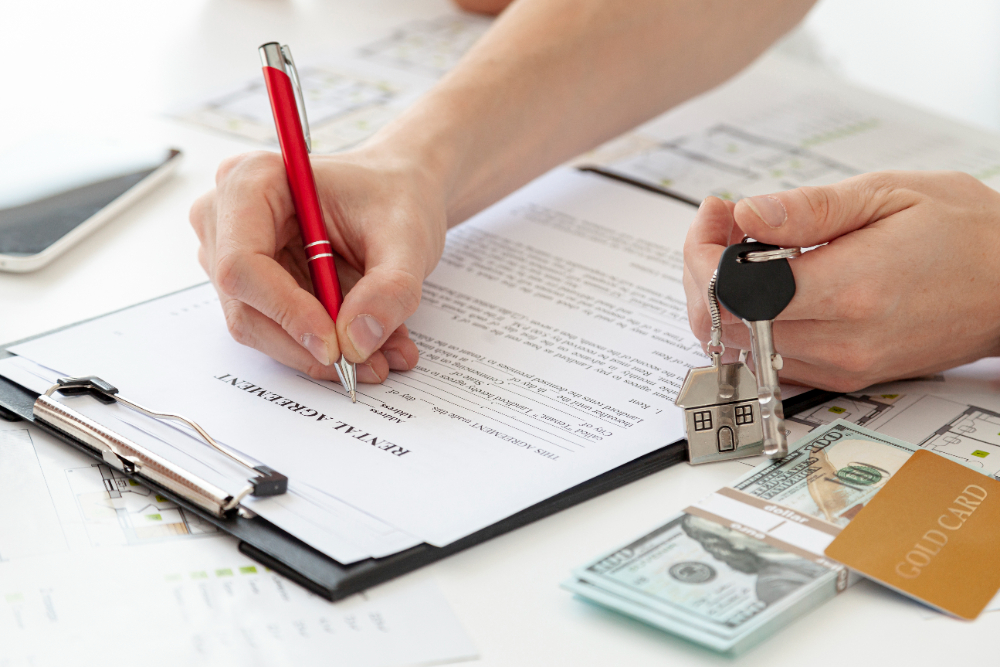Buying or selling a property is an exciting milestone, but it can also come with stress and
uncertainty, particularly when understanding the conveyancing process. The conveyancing
timeline often varies, but it takes an average of 8-12 weeks. Conveyancing refers to the legal
transfer of property ownership from one party to another, and it’s a crucial aspect of any
property transaction. If you’re a UK homeowner or homebuyer wondering how long this
process takes, you’re not alone. This blog will provide a clear and concise overview of the
conveyancing timeline, helping you set realistic expectations and understand the factors
that can influence the duration.

Average Conveyancing Timeline
The timeframe of 8-12 weeks on average starts when you instruct a conveyancer and ends
on the day you complete the transaction. It’s important to remember that this is a general
estimate; no two property transactions are the same, and the process could take more or
less time, depending on the circumstances. To give you a better sense of what’s involved,
here’s a breakdown of the key stages of the conveyancing process and their average
durations:
- Instruction of Conveyancer (1-2 Weeks)
The process begins when you instruct your conveyancer or solicitor. They will gather
information about the property and provide you with terms of engagement. If you’re
buying a house, your conveyancer will ask you for identication, proof of funds, and a
signed client care letter. Sellers must provide details about the property and complete
forms such as the Property Information Form (TA6). This initial step usually takes about one
to two weeks. - Searches and Enquiries (2-4 Weeks)
If you’re buying a property, your conveyancer will conduct a series of searches to uncover
any issues that might affect the property. This includes local authority searches,
environmental searches, and drainage and water searches. While some searches return
quickly, local authority searches can sometimes take several weeks, depending on the
council’s workload. During this time, your conveyancer will also raise enquiries with the
seller’s solicitor about any potential issues with the property. - Draft Contract and Negotiation (2-4 Weeks)
The seller’s conveyancer prepares a draft contract, which outlines the terms of the sale, and
sends it to the buyer’s conveyancer. Both parties may negotiate terms or raise additional
enquiries, which can lengthen this stage. If all documentation is in place and both parties
are satised, this step can be completed relatively quickly. - Mortgage Offer and Approval (2-3 Weeks)
If you’re buying with a mortgage, your lender must conduct a property valuation and issue
a formal mortgage offer. This process can take a few weeks, mainly if there are delays in
obtaining the necessary documentation or if the valuation reveals issues with the home that
could affect the loan. - Exchange of Contracts (1 Week)
The contracts are exchanged once all searches, enquiries, and negotiations are complete,
and the buyer has their mortgage offer. The transaction becomes legally binding at this
stage, and a deposit (typically 5-10% of the purchase price) is paid. The date for completion
is also agreed upon during this stage. - Completion (1-2 Weeks)
Completion usually takes place one to two weeks after contracts are exchanged. On this
day, the remainder of the purchase money is transferred, and the buyer receives the keys to
their new property. For sellers, this is when they ofcially hand over ownership. Completion
may take longer if you’re part of a property chain, as all parties must coordinate their
transactions.

Factors Influencing Conveyancing Time
While the average timeline provides a general guide, numerous factors can speed up or
delay the process. Here are some of the most common ones:
Property-Related Factors
• Leasehold vs Freehold: Leasehold properties typically take longer to process
because additional enquiries are required, such as reviewing the lease and
contacting the freeholder or managing agent.
• New Build vs Existing Property: Buying a new build can sometimes involve delays,
mainly if the property is unnished or the developer hasn’t secured the necessary
approvals.
• Property Chains: If you’re part of a chain where multiple transactions depend on one
another, delays in one link can affect everyone.
• Complex Titles: Properties with unclear ownership or title issues will require
additional investigation, which can extend the timeline.
Buyer/Seller-Related Factors
• First-Time Buyer: First-time buyers who don’t need to sell a house simultaneously
often experience a faster process, as chains are avoided.
• Responsiveness to Queries: Prompt responses to documentation and queries from
your conveyancer can help keep things moving.
• Mortgage Complications: Delays in securing a mortgage offer or resolving issues
identied during the valuation process can slow things down.
• Personal Circumstances: Situations such as illness, family emergencies, or difculty
obtaining necessary paperwork can also impact timings.
External Factors
• Search Delays: Local authority searches can take longer in some areas, mainly if
councils are understaffed or experiencing high demand.
• Bank Holidays: Public holidays can temporarily halt progress, especially if they fall
near critical stages of the process.
• Unexpected Issues: Issues such as structural problems, boundary disputes, or
unregistered land can require additional time to resolve.

Tips for a Smoother Conveyancing Process
While some delays are beyond your control, there are proactive steps you can take to
ensure the conveyancing process runs as smoothly as possible:
• Instruct a Conveyancer Early | Start the process when you decide to buy or sell a
house. This gives your conveyancer a head start in gathering the necessary
documentation.
• Be Responsive and Organised | Reply promptly to queries and requests for
information from your conveyancer. Keep all necessary documents handy to avoid
unnecessary delays.
• Address Enquiries Promptly | Whether you’re buying or selling, quickly addressing
enquiries about the property can help keep the process on track.
• Consider Using an Online Conveyancing Service | Online conveyancers often
provide greater efciency, faster communication, and real-time updates, giving you
peace of mind.
Start Your Conveyancing Journey Today
Conveyancing doesn’t have to be overwhelming or confusing. With the right conveyancer
and preparation, you can stay on top of the process and avoid unnecessary delays.
Use our online conveyancing quote system to get an instant estimate and condently start
your conveyancing process. Alternatively, contact us today for a personalised consultation
with our expert conveyancers, who guide you every step of the way.
Make your move with ease, and start your conveyancing process today.



